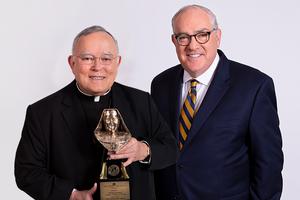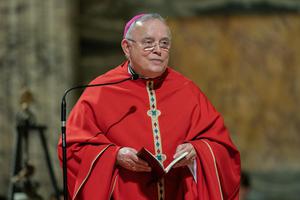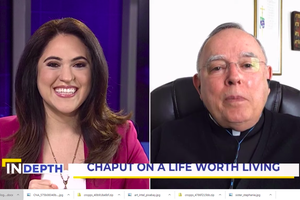Archbishop Chaput on Archbishop Gomez’s Election, Voting Issues, Communion Denial
Speaking with the Register during the USCCB’s fall assembly, Philadelphia’s shepherd addresses a number of key current issues — and the selection of his former auxiliary as the new USCCB president.

BALTIMORE — Archbishop Charles Chaput of Philadelphia spoke with the Register Nov. 12 at the U.S. Conference of Catholic Bishops’ fall assembly, shortly after the expected election of Archbishop José Gomez of Los Angeles to succeed Cardinal Daniel DiNardo of Galveston-Houston as president of the USCCB.
Archbishop Chaput, who on Sept. 26 turned 75, the age at which bishops must submit their resignations to the Vatican, discussed the new head of the bishops’ conference, the concept of synodality, the merits of denying Communion to politicians who publicly advocate for abortion, and some issues that arose at the meeting, including the preeminence of abortion among the issues that Catholic voters should prioritize.
What is your reaction to the elections, the new leadership in the USCCB?
I’m a real fan of Archbishop Gomez because he was my auxiliary bishop in Denver, and I ordained him a bishop, so we have a special relationship; it goes back a long time. I’m personally very, very happy for him and for his family, who I know in Mexico, but, also, I’m grateful to God that the Church has a Hispanic as the leader of our bishops’ conference. I think that’s very important: to show the whole Church the significant role that Latinos play in the Church now in the United States.
The vast majority of the young people of the Church are Latino and Latina, so it’s really important that they have someone in the leadership of the USCCB that looks like them and speaks like them. It’s a real blessing for everybody involved.
What do you think, with the upcoming 2020 elections, are some of the most important issues for U.S. Catholics to consider in light of their Catholic faith?
Well, the most important issues in light of our Catholic faith are abortion and religious freedom. In terms of our responsibility for the care of the poor, it would be immigration. All of those are important, but the foundational ones really are, for us, the life of everyone. Abortion is the big issue, and religious freedom, which gives us the ability to even say that publicly and aloud in a culture that is not clearly pro-life. Those are really foundational issues.
Of course we have an obligation to care for the poor or we’re going to go to hell, so it’s important for us to also be very sensitive to the immigration issues, and it’s also about the common good and the support of families that are all involved in that immigration issue. For the Church, it is really about families and protecting children. We want immigration laws to change so that family unity is protected in the regulations around it that we have in our country.
What are your thoughts on the practice of withholding Holy Communion for pro-abortion politicians, like former Vice President Joe Biden? Do you think that practice is effective?
I personally think it’s effective because if we accept positions that are contrary to the teachings of Jesus, why would we pretend to be in communion with him? Going to Communion when we stand apart from what he teaches is really a violation of basic principles of integrity and truth.
I think it’s a very good thing, but I think it would be better if the politicians who don’t accept Church teaching would just stay away from Communion rather than force a conflict. They know better than that.
Could I get your thoughts on the update on the Theodore McCarrick scandal at the meeting, indicating that the Vatican would release a report on it soon?
I’m very happy to hear the report is finally coming. It has sure taken a long, long time, and I think many people were really beginning to think it wouldn’t come out at all. I was happy to hear Cardinal [Seán] O’Malley’s report that it will be coming sometime soon, hopefully within a month or two.
Do you think that there should be changes in seminary formation in light of the links to the McCarrick scandal with seminarians and allegations of homosexual subcultures in some seminaries?
I can’t imagine the seminary that would allow that kind of behavior. If they do, there ought to be a lot of changes, but I think in terms of the seminarians I know, they’re very clearly committed to fidelity, Church teaching and chastity in the seminary life, but also in terms of training seminarians to be faithful and chaste priests.
The propaedeutic stage [an introductory phase of formation typically adding an additional year to the process] is being discussed with the sixth edition of the “Program of Priestly Formation.” What were your thoughts on that?
Everywhere I’ve been as bishop where I’ve had a seminary, which is just simply Denver and Philadelphia, I’ve started a propaedeutic year, so I’m a great fan of it. I can’t imagine a seminary without it. We call it “spirituality year” in both Denver and in Philadelphia, and it’s borne wonderful fruit. I think that if bishops really had an exposure to what good that does, they would all be enthusiastic about embracing it. I’m glad it’s in the program for priestly formation and hope that more and more bishops will embrace it as a great idea.
The thing that stands in the way is it takes more time, of course, another year of formation; and it’s costly — every year we keep a seminarian in training it’s like a parent keeping a child in college, so it’s a very expensive proposition, but it bears fruit in the end.
This idea of “synodality” coming out of the Pan-Amazon synod: What are your thoughts on it?
I don’t think anybody has a clear idea because there’s no definition of it. There’s no Church documents in the West that explain it. It’s really an Eastern Church concept more than one that we’re familiar with, but if it simply means that the bishops have a duty to consult the faithful and the religious and clergy on all the major issues of the Church, I firmly believe that.
I mean, I think any bishop who has common sense would be committed to doing that, and that’s different, of course, than saying everybody has an equal vote on these matters, because when it comes to matters of faith and morals, the Lord has entrusted that responsibility to the bishops of the Church in union with the Holy Father. To involve the faithful is really important, and to involve women as well as men is very, very important. I’ve never understood male synodality that doesn’t include women. It seems like you should include them, too.
Lauretta Brown is the Register’s Washington-based staff writer.

















